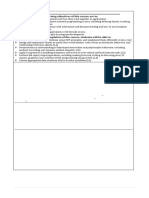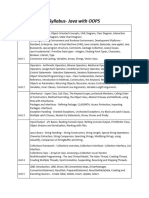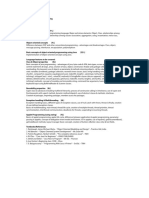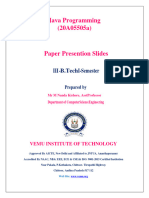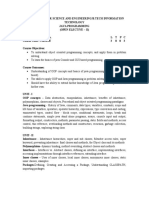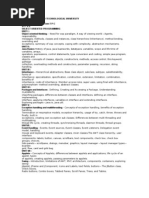0 ratings0% found this document useful (0 votes)
3 viewsOOP Java Unit1 Unit2 Notes
The document provides an overview of Object-Oriented Programming (OOP) using Java, covering key concepts such as classes, objects, encapsulation, inheritance, and polymorphism. It includes details on Java fundamentals like data types, control flow statements, exception handling, and the Collection API. Additionally, it discusses the Java compilation process, JVM, and security aspects, emphasizing the importance of OOP in software development.
Uploaded by
RGSCopyright
© © All Rights Reserved
We take content rights seriously. If you suspect this is your content, claim it here.
Available Formats
Download as PDF, TXT or read online on Scribd
0 ratings0% found this document useful (0 votes)
3 viewsOOP Java Unit1 Unit2 Notes
The document provides an overview of Object-Oriented Programming (OOP) using Java, covering key concepts such as classes, objects, encapsulation, inheritance, and polymorphism. It includes details on Java fundamentals like data types, control flow statements, exception handling, and the Collection API. Additionally, it discusses the Java compilation process, JVM, and security aspects, emphasizing the importance of OOP in software development.
Uploaded by
RGSCopyright
© © All Rights Reserved
We take content rights seriously. If you suspect this is your content, claim it here.
Available Formats
Download as PDF, TXT or read online on Scribd
You are on page 1/ 3
Object-Oriented Programming (OOP) Using Java - Unit 1 & 2 Notes
Unit 1: Introduction to Object-Oriented Programming
1. Object-Oriented Programming (OOP) Overview:
- Definition and Importance
- Procedural vs. Object-Oriented Programming
2. Benefits of Object-Oriented Development:
- Code Reusability, Modularity, Maintainability, Scalability
3. Core OOP Concepts:
- Classes and Objects
- Encapsulation, Inheritance, Polymorphism, Abstraction
4. Object-Oriented Design (OOD):
- Principles of OOD, UML (Unified Modeling Language)
5. Overview & Characteristics of Java:
- Platform Independence, Object-Oriented Nature, Memory Management, Exception Handling
6. Program Compilation & Execution Process in Java:
- Java Compilation Process, JVM (Java Virtual Machine), JRE vs. JDK
7. Java Virtual Machine (JVM) & Security Aspects:
- Bytecode Verification, Class Loaders, Security Manager
8. Sandbox Model:
- Concept and Role, Restricting Untrusted Code
Unit 2: Java Fundamentals
1. Data Types and Literals:
- Primitive Data Types, Reference Data Types
2. Wrapper Classes:
- Auto-boxing and Unboxing
3. Arrays:
- One-Dimensional and Multi-Dimensional Arrays, Array Manipulation
4. Operators in Java:
- Arithmetic, Logical, Relational, Bitwise
5. Control Flow Statements:
- If-Else, Switch
- Loops (For, While, Do-While)
6. Classes and Objects:
- Creating Classes and Objects, Instance and Static Members
7. Class Member Modifiers:
- Access Specifiers (Private, Public, Protected, Default)
8. Inner Classes & Abstract Classes:
- Anonymous Inner Classes, Abstract Class & Method Implementation
9. Inheritance in Java:
- Types of Inheritance, Method Overriding, Super Keyword
10. Exception Handling:
- Try-Catch, Finally Block, Throws and Throw, Custom Exceptions
11. Collection API:
- List, Set, Map Interfaces
- Implementation Classes (ArrayList, HashSet, HashMap, etc.)
12. Iterators:
- Iterator vs. ListIterator
You might also like
- Java Algorithms for Beginners: A Practical Guide with ExamplesFrom EverandJava Algorithms for Beginners: A Practical Guide with ExamplesNo ratings yet
- Object_Oriented_Programming_through_Java_Digital_Notes_Maruthi_PNo ratings yetObject_Oriented_Programming_through_Java_Digital_Notes_Maruthi_P136 pages
- Object-Oriented Programming Through JavaNo ratings yetObject-Oriented Programming Through Java12 pages
- Object Oriented Programming through JAVANo ratings yetObject Oriented Programming through JAVA3 pages
- Croma Campus - Core Java Training CurriculumNo ratings yetCroma Campus - Core Java Training Curriculum8 pages
- CORE JAVA Syllabus: 1. Core Java Programming Introduction of JavaNo ratings yetCORE JAVA Syllabus: 1. Core Java Programming Introduction of Java9 pages
- Object Oriented Programming Through JavaNo ratings yetObject Oriented Programming Through Java131 pages
- Java Programming (20A05505A) : Iii - B.Techi-SemesterNo ratings yetJava Programming (20A05505A) : Iii - B.Techi-Semester553 pages
- Java Learning Roadmap For Beginners - KabiroskyNo ratings yetJava Learning Roadmap For Beginners - Kabirosky6 pages
- Java Basics-Curriculum: Școala Informală de ITNo ratings yetJava Basics-Curriculum: Școala Informală de IT9 pages
- OOPJ_R23_II-I_MicroSylllabusFinalModelPaperNo ratings yetOOPJ_R23_II-I_MicroSylllabusFinalModelPaper8 pages
- 24CSE102_Object Oriented Programming_ 1st Sem_CPSNo ratings yet24CSE102_Object Oriented Programming_ 1st Sem_CPS3 pages
- Mastering Java Reflection and Metaprogramming: Unlock the Secrets of Expert-Level SkillsFrom EverandMastering Java Reflection and Metaprogramming: Unlock the Secrets of Expert-Level SkillsNo ratings yet
- Mastering Advanced Object-Oriented Programming in Java: Unlock the Secrets of Expert-Level SkillsFrom EverandMastering Advanced Object-Oriented Programming in Java: Unlock the Secrets of Expert-Level SkillsNo ratings yet








